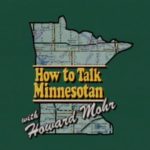Language opens one to understanding the self and the world: The Minnesota Undergraduate Linguistics Symposium
The Minnesota Undergraduate Linguistics Symposium was a reminder of the ways today’s young people are preparing for the world. Undergraduates from all over the state came together to share their research and learn about the research of faculty at UMD and CSS.
The faculty presentations included the diversity of approaches to linguistics and language.
Ted Pedersen (UMD Computer Science), in “Puns upon a midnight dreary, lexical semantics for the weak and weary,” shared his research into using computers to detect puns. If we can train a computer to detect a pun, we learn a lot about how we process and comprehend the meaning (and multiple meanings) of language, as well as enhance efforts in machine translation (like Google Translate).
Michael Sullivan, of the Waadookodaading Ojibwe Language Immersion School, delivered “Ojibwe as a Heritage Field Language.” In this, he shared with us the complexities of language documentation, preservation, and revitalization of Ojibwe.
In “Rethinking the teaching of grammar from the perspective of corpus linguistics,” Chongwon Park (UMD Linguistics) shared the lastest in computational/digital research into language. He analyzed thousands of sentences from the Corpus of Contemporary American English to answer the question:
Which is preferred: “Neither of them is preferable” or “Neither of them are preferable“?
He found that both uses are acceptable — and he explained that this is not because people make mistakes, but because our minds make complicated webs of decisions as we speak. That both forms are acceptable is a reflection of the cognitive complexity of our minds.
In these presentations, we learned the importance of language as a window into the operations of our brains and the construction of our communities.
Student presentations, in the meantime, addressed Japanese, Korean, Norwegian and other languages. They addressed pain in doctor-patient discourse (a charged, powerful site of communication) and they addressed the simple oddity of a sentence like this: “The real me just wants to be happy.” (Old fashioned grammar enthusiasts could claim that the sentence should read “The real I just wants to be happy.” But that sounds awkward. The first sentence does not. What does that tell us about the operations of our mind?)
Thanks to faculty in the Linguistics Program in the Department of English, Linguistics, and Writing Studies for organizing this event.
Recommended Links:
Leave a Comment
Only registered members can post a comment , Login / Register Here











No Comments